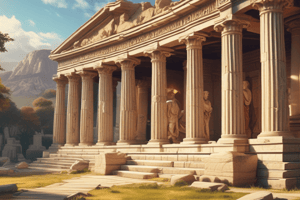Podcast
Questions and Answers
Which ancient military group was led by Athens to defeat the Persians?
Which ancient military group was led by Athens to defeat the Persians?
- Sicilian Forces
- Peloponnesian League
- Hellenistic League
- Delian League (correct)
Pericles was known as the creator of democracy in ancient Greece.
Pericles was known as the creator of democracy in ancient Greece.
True (A)
What is the primary focus of the Hippocratic oath?
What is the primary focus of the Hippocratic oath?
Ethics in medicine
The _______ was a significant battle in which the Greeks defeated the Persians in 490 BC.
The _______ was a significant battle in which the Greeks defeated the Persians in 490 BC.
Match the following artifacts with their descriptions:
Match the following artifacts with their descriptions:
Flashcards
What is the Delian League?
What is the Delian League?
The Delian League was a military alliance led by Athens, formed after the Greco-Persian Wars. It was a combination of Greek city-states who aimed to protect Greece from future Persian invasions.
Who is Pericles?
Who is Pericles?
Pericles was a prominent Athenian statesman, orator, and general during the Golden Age of Athens. He was responsible for many of the city's cultural and architectural achievements.
What is the Socratic Method?
What is the Socratic Method?
The Socratic Method is a form of inquiry and discussion based on asking questions to stimulate critical thinking and uncover underlying assumptions.
What is the Peloponnesian War?
What is the Peloponnesian War?
Signup and view all the flashcards
What is the Golden Age of Athens?
What is the Golden Age of Athens?
Signup and view all the flashcards
Study Notes
Ancient Greek History and Culture
- Xerxes/Darius: Persian King, 500 BCE and 480 BCE; 100,000 troops, 10,000 elite forces, 1000 ships (immortals).
- Symposium: The last part of a banquet.
- 399 BCE: Trial of Socrates.
- Battle of Marathon: Battle between Athens and Persia; Athens won. Significant loss for Persians and few casualties for Athenians. A messenger ran 26 miles to announce the victory to Athens.
- Tragedy: "Goat song," used to honor Dionysus.
- Academy/Lyceum: Philosophical schools, likely locations of study & debate.
- Delian League: Military alliance led by Athens to defeat the Persians.
- Old Comedy: Form of theatre with explicit & crude humor, honoring Dionysus.
- Stoics: Hellenistic philosophy school, based in Greece and Rome.
- Pericles: Leader who created Athenian Democracy.
- Peloponnesian War: Conflict between Athens and Sparta.
- Epicureans: Followers of Epicurus, a philosopher.
Ancient Greek Figures and Events
- Thucydides: Historian known for documenting the Peloponnesian War.
- Alcibiades: A controversial leader during the Peloponnesian War (student of Socrates) and switched sides.
- Hippocrates: Considered the "father of medicine."
- Golden Age of Athens (480-404 BCE): Period of economic growth and cultural flourishing.
- Sicilian expedition: Military campaign.
- Doric/Ionic order: Styles of architecture (Doric – sturdy, wide columns; Ionic – slender, feminine columns).
- Delphi: A religious center in Greece.
- Parabasis: Point in a play where actors leave the stage and the chorus addresses the audience.
- The City Dionysia: Religious festival in Athens celebrating Dionysus with wine and drama.
- Areopagus: Athenian supreme court.
- Chaeronea: Battle where Thebes and Athens were defeated and assisted by Alexander the Great (first battle).
- Panathenaia: Festival in Athens honoring Athena.
- Pre-Socratics: Ancient Greek thinkers before Socrates (philosophers/thinkers).
- Sarissa: Spear of the Macedonian army.
- Demosthenes: Notable Greek orator, father of Alexander the Great.
- Pindars Victory Odes: Collections of poems celebrating athletic victories.
- Sophists: Paid teachers of philosophy and rhetoric in ancient Greece.
- Gymnasium: Place for exercise.
Socrates, Methodology, and History
- Socratic Method: Questioning method to reach truth (uncover facts, ask leading questions).
- 323 BCE: Death of Alexander the Great in Babylon.
- Hellenistic Period: Period following Alexander's death; ended with Marc Antony's defeat (battle of Antium).
Artifacts and Art
- Statue of Pericles: Represents the creator of democracy.
- Charioteer at Delphi: Statue dedicated to Apollo.
- Temple of Apollo at Delphi: Architectural example of the time
- The Tyrannicides: Statues of Harmodius and Aristogeiton (tyrant killers).
- Pot of Achilles and Ajax: Pottery showcasing mythological characters.
- Discobolus: Statue of a discus thrower (famous example of Greek athleticism).
- The dying Gaul: Sculptures of a barbarian (celtic man) dying, perhaps during a war.
Studying That Suits You
Use AI to generate personalized quizzes and flashcards to suit your learning preferences.




